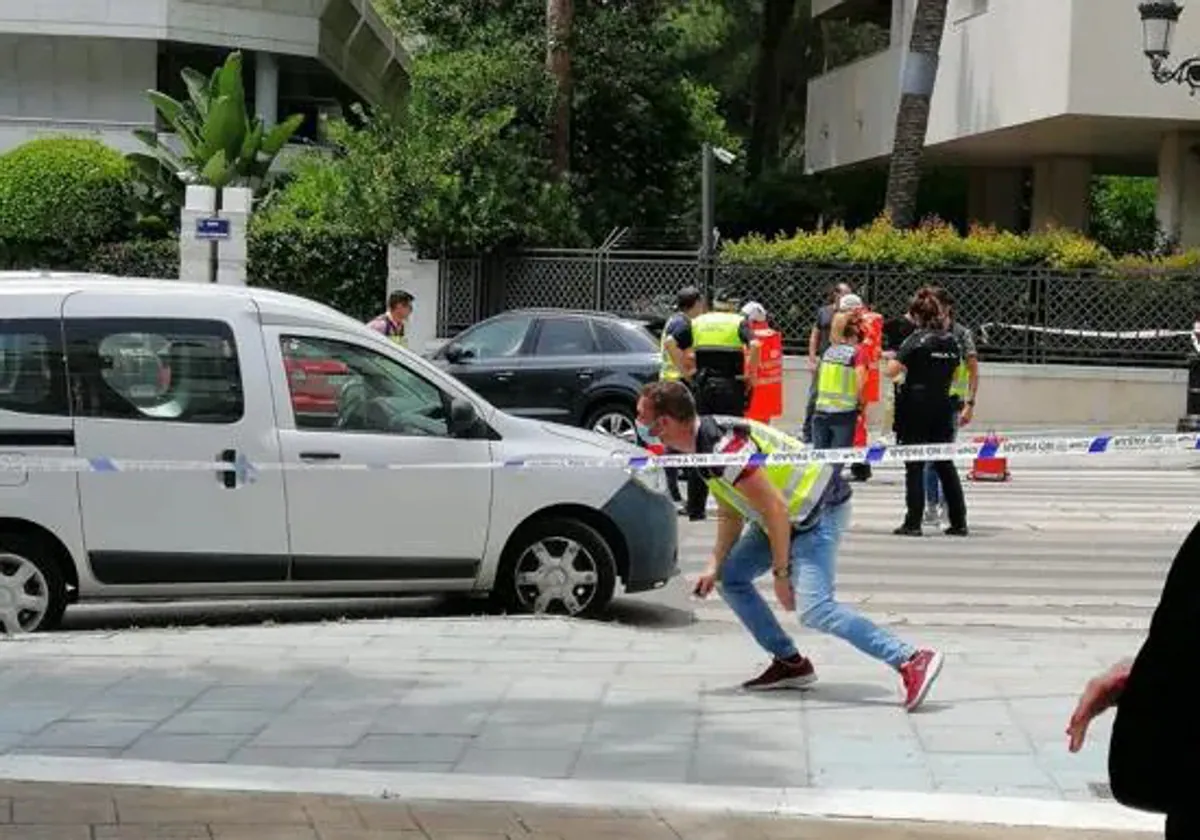Two alleged hitmen to go on trial for the shooting of a man in Marbella town centre
The public prosecutor's office is calling for 35 years in prison for one of them for the murder and for possession of weapons of war, while it is increasing the proposed sentence to 38 years for the second suspect by adding the crime of forgery of documents
Two alleged hitmen are due to go on trial in Malaga at the end of this month, charged with the murder of a man in a Marbella street in 2020.
The victim died after being riddled with bullets in the centre of the town. He was initially identified as 40-year-old Bosnian national Slavisa Z., according to his passport. His real name, however, was Milos P. and he was born in Montenegro. On 2 June 2020 he was killed in broad daylight on a pedestrian crossing, barely a hundred metres from the house where he lived. According to the public prosecutor's office two hitmen had been commissioned to execute him in exchange for financial remuneration. Both will sit in the dock this month, in the provincial court of Malaga, to answer murder charges.
As described by the public prosecution in its indictment - to which SUR has had access - the sequence was as follows: at around 1pm on 2 June, the two accused got on board a Suzuki Burgman motorbike which they used to travel to the vicinity of Milos' house, allegedly with the intention of ending his life. Both had their faces hidden with caps and masks to avoid being identified. They approached the victim some fifty minutes later, when he left his home.
One of the defendants, according to the prosecution, stood by the motorbike while the other allegedly approached Milos from behind as he was crossing a pedestrian crossing. He pulled out a type of submachine gun that is considered a weapon of war, and began firing. The first four bullets, which struck at chest level, caused the victim to fall to the ground, according to the prosecution. In total, he was shot twelve times, which caused his death on the spot. The two alleged assassins then disappeared from the scene of the crime on the same motorbike.
The defendants allegedly used a Grand Power gun fitted with an automatic firing device. Apparently, it had been modified to be converted into an automatic firearm, which, according to the prosecution, is considered to be a prohibited weapon of war, in accordance with weapons regulations. In the course of the investigation, the Marbella court authorised the search of a house, which was allegedly used by the suspects in the days prior to and immediately after the events.
The prosecution alleges that the two suspects were responsible for the crime of murder and possession of weapons of war, for which it is calling for sentences of 35 years in prison. In the house that was searched, according to the public prosecutor's office in its report, numerous false documents were also found in which the image of one of the suspects appeared with the name of another person, hence this individual is also being charged with the crime of false documentation for which he faces a possible further three years in prison and a fine of 18,000 euros.
Unknowns
The investigation was surrounded by unknowns from the beginning given the false documentation with which the victim, who had even been convicted under his false identity for drug trafficking in Spain, was found. Milos had reportedly arrived in Spain in 2013 as Slavisa Z. A year later he was arrested in waters off Ceuta aboard a boat with 31 kilos of cocaine.
His case fell to a special group of the National Police focused exclusively on solving gang crime on the Costa del Sol. Once the mystery of Milos' identity had been solved, it became clear to investigators that his crime was part of an ongoing war between Balkan gangs that left a trail of murders across half of Europe. The Montenegro national was allegedly a member of one of these groups, although he is not considered to be in the upper echelons of the organisation.
The investigators, assisted by the Udyco and Greco Costa del Sol units, managed to identify the alleged hitmen, who fled the province after the murder. With the help of their counterparts in Barcelona and Gerona, they managed to locate both in Catalonia, where they were arrested barely a month after the crime.
The two alleged perpetrators of the murder are scheduled to sit in the dock at the end of this month in front of a jury. However, sources from the High Court of Justice of Andalucía (TSJA) point to the possibility of a possible out-of-court agreement, which would imply a guilty plea by the accused.

